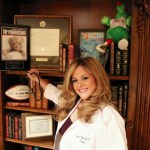A 7-year-old girl is wowing the internet with not only her knowledge of neurotransmitters and synapses, but also her passion for science experiments and big dreams of one day becoming a neurosurgeon.
Scientists and science communicators would be wise to watch Amoy Antunet in this BBC Trending viral video. She brings effective messaging back to the basics. With an affability not to be understated in importance, she is succinct, authentic and simplifies the complex with relatable references. Her joy from the subject matter is evident and draws viewers into her world.
Somewhere along the way as we mature and acquire more and more formal education, we complicate things. We become shackled with over thinking or limited by agenda. Whether it be to raise money for research or impress peers or hold tightly to perfectionistic tendencies to be thorough as our depth of knowledge in a field ever deepens, we can often miss the forest for the trees when trying to convey our point-of-view or educate others.
There are tangible repercussions to poor messages. Obtaining funding for valuable research will be impeded. Delivering truly informed consent in healthcare will be torpedoed which can serve to erode the doctor-patient relationship. Heck, the litany is endless in all aspects of life when it comes to poor communication.
This is so recognized an issue that actor Alan Alda realized after hosting for many years a PBS show Scientific American Frontiers, where he interviewed countless scientists from around the world, “that many researchers have wonderful stories to tell, but need to learn how to tell them better.” This prompted the Stony Brook University to create the multi-disciplinary Alan Alda Center for Communicating Science in 2009. “Communication is not something extra you add on to science,” according to Professor Alda on their site. “It is the essence of science.”
Again, his message is so simple. Which is what empowers it.
In a culture so enchanted with more being more and the ever diminishing attention span, appreciating that less can be more is pivotal in particular in the healthcare realm. It will often serve you best in terms of patient safety and routinely when in the position to deliver care.
When Amoy is asked why science? Her response, “I like science because there is always something new to learn. It’s always changing.” And, swiftly, she expresses her curious mind while underscoring science’s fundamental truth.
Taking complex concepts and making them palatable for others is an asset, even a natural gift for some. Its value is priceless when advocating for a patient or diverting of resources to cure disease.
These skills need to be adapted to the mode of delivery. I have found my written pieces resonate the most when I write how I speak. This is not always easy for me given the diverse nature of topics and my desire to be comprehensive. It is in those moments when I consciously edit myself-- sometimes with difficulty in eliminating jargon--that I channel that guiding principle. Hopefully, I am successful more times than I am not.
It is quite commendable to see a father nurture a child’s innate interest like Amoy’s does with these educational videos and performing science experiments as an activity. Whatever a child’s passion, exploring it and leading by example are some of their most influential and defining moments.
With her obvious love of teaching others, she leaves us with an invaluable lesson and reminder: keep it simple. If it’s that complicated, then we may not understand it enough.

